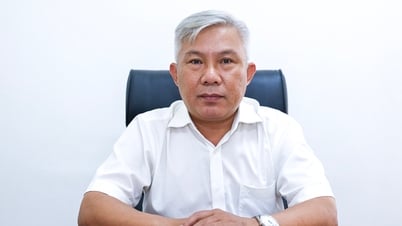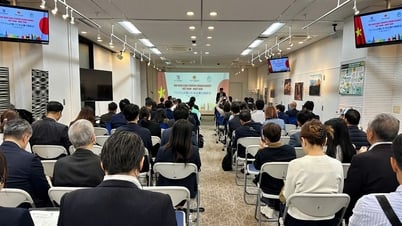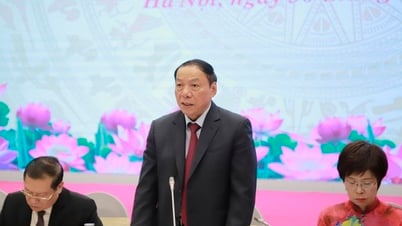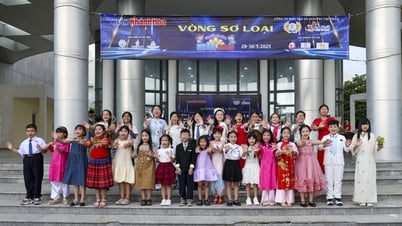Some countries extend the retirement age to 70 - 75 years old.
According to the draft Law on Cadres and Civil Servants (amended) being sent by the Ministry of Home Affairs to the Ministry of Justice for appraisal, there are many new policies, notably the drafting agency raised the issue that Vietnam should refer to the experience of other countries on early retirement and extending the retirement age to 70 in some fields.
Proposal to increase retirement age for civil servants in some fields is receiving mixed opinions.
Citing international evidence, the Ministry of the Interior said that some countries stipulate retirement at the age of 60 - 65, but have early retirement regimes when civil servants have guaranteed years of service, want to focus on business, take care of elderly parents and children. On the contrary, they extend the retirement age to 75 for some technical fields, high expertise, consultants, and experts.
For example, civil servants in China retire when they reach retirement age or are completely incapacitated. The country also stipulates that civil servants can retire early if they voluntarily apply for retirement and are approved by the management agency after having worked for 30 years; less than 5 years from the state-set retirement age and having worked for 20 years.
In the United States, civil servants retire at the right age when they are 60 years old and have 30 years of service or 62 years old and have 20 years of service. After completing 25 years of service or 50 years old and have 20 years of service, civil servants can also retire early.
Meanwhile, civil servants in France have a retirement age of 67, which can be extended to 70 and 75. If a family has a disabled member or a child who sacrificed for the country, the retirement age is reduced by one year for each child. Retired civil servants are awarded honorary titles according to their rank or job, provided they have worked for at least 20 years.
In Japan, administrative civil servants retire at 60 years old; for special positions where it is difficult to fill positions, the retirement age is over 60 years old but not over 65 years old. Civil servants participating in the protection of government buildings and technical staff are 63 years old. Medical staff have a retirement age of 65 years old. This regulation does not apply to temporary civil servants, civil servants appointed during the term of office and civil servants working part-time. The Minister has the right to extend the service period of civil servants who have reached the mandatory retirement age by 1 year and can extend it once after agreeing with the National Personnel Council.
In Southeast Asia, Thai civil servants retire at age 60. For technical positions or tasks requiring personal skills, they can continue to serve the Government until age 70.
In Vietnam, the retirement age of civil servants is implemented according to the 2019 Labor Code. Accordingly, from 2021, the retirement age will increase by 3 months per year for male workers and 4 months for female workers under normal working conditions until men reach 62 years old in 2028 and women reach 60 years old in 2035. Workers with high professional and technical qualifications and some special cases can retire at a higher age, but not more than 5 years older than the prescribed age at the time of retirement.
From international experience, the Ministry of Home Affairs believes: "Vietnam should refer to the experience of other countries in regulating early retirement and for some fields requiring high technical skills, experts and consultants can extend the retirement age to 70".
Should only be applied to professionals, not to leadership positions.
From the perspective of a labor expert, Mr. Pham Minh Huan, former Deputy Minister of Labor, Invalids and Social Affairs (now the Ministry of Home Affairs), assessed that in terms of social insurance, raising the retirement age will increase the contribution time and reduce the pension time of workers, and the safety of the social insurance fund will also be better.
However, the policy needs to be studied comprehensively and thoroughly. The most important issue when considering and researching raising the retirement age is not experience but human health. "A doctor at the age of 70 may have a lot of experience, but at that time his hands and feet cannot be steady enough to perform surgery. The older he gets, the more his health declines and his labor productivity also decreases, especially for female workers, many people over 60 are in poor health," said Mr. Huan.
According to Mr. Huan, in Vietnam today, many talented and knowledgeable civil servants and officials are still hired by businesses and units after retirement, but usually they only sign one-year or three-year contracts, not long-term contracts. "It is best to let the market adjust, whoever does well, who is still healthy and capable, the agency will sign a contract to continue working," Mr. Huan expressed.
In reality, in Vietnam, workers, whether manual or intellectual, when they reach the age of 70, their health, intelligence, research and operational abilities also deteriorate. Ms. Bui Thi Thanh, former Vice President of the Central Committee of the Vietnam Fatherland Front, said: "It is not advisable to propose universal retirement at the age of 70, except in special cases such as scientific researchers or experienced people. But in my opinion, we should not encourage raising the retirement age to 70, but should keep it as it is now."
Mr. Bui Sy Loi, former Vice Chairman of the National Assembly's Social Committee, said that extending the retirement age, if any, should only be applied to professionals, and leadership positions should not be held when one is old.
"Continuing to hold leadership positions at an old age can affect the rejuvenation of the staff, limit development opportunities for the next generation, and even lead to stagnation in organizational innovation. Society really needs the contributions of qualified people who are still healthy, but the selection of those who stay needs criteria, we must choose those who are eager to contribute to the country, want to contribute to the development of the country and the nation. If we do not have criteria, many people will take advantage of us to profit from our salaries," Mr. Loi noted.
The issue of increasing the retirement age should not be raised at this time.
Professor and Doctor Tran Ngoc Duong, former Deputy Head of the National Assembly Office, said that the proposal to extend the retirement age in some fields needs to be recalculated, because countries lack labor resources, so they have to extend the retirement age to take advantage of the elderly to do jobs. "In Vietnam, under current conditions, the productive forces are still abundant, there are still many young people, so in my opinion, the retirement age should still be regulated by law, that is, men retire at 62 and women at 60. Although people's life expectancy has been increased, many people at 70 years old are still healthy, but there are also many people who are sick and ill. When our country's population ages and the labor force is exhausted, the retirement age should be raised to 70," Mr. Duong stated his opinion.
However, according to Professor Tran Ngoc Duong, in the future, some professions may consider extending the period, such as medicine and teaching, but this will only apply to those who are experienced, intelligent, and especially those who are in good health.
Prof. Dr. Le Van Trinh, Chairman of the Vietnam Association for Science, Technology, Safety and Hygiene, acknowledged that Vietnam is currently in the process of streamlining its apparatus, so the issue of raising the retirement age should not be raised at this time. At least in the next 3 years, the apparatus can operate stably. "According to the development of society, raising the retirement age should be considered in the future, perhaps after 2035 when Vietnam becomes an upper middle-income country. Experts and researchers can continue to sign contracts as civil servants and public employees, but they must not hold management positions," Prof. Dr. Trinh suggested.
Agreeing with the above opinion, Mr. Nguyen Van De, Member of the Central Committee of the Vietnam Fatherland Front, Chairman of the Vietnam Private Hospital Association, stated that after the arrangement and merger, the state sector still has a large number of cadres, civil servants and public employees.
"If we raise the retirement age, the younger generation will be discouraged and not want to strive, and the talented people who are about to succeed them will not want to work anymore. There is no reason to raise the retirement age to 70 for some professions and fields, except perhaps in special, individual cases, those are truly talented people, then the Party and State will decide," Mr. De frankly said./.
According to Thanh Nien Newspaper
Source: https://thanhnien.vn/de-xuat-tang-tuoi-nghi-huu-cho-mot-so-cong-chuc-len-70-185250419224740306.htm
Source: https://baolongan.vn/de-xuat-tang-tuoi-nghi-huu-cho-mot-so-cong-chuc-len-70-a193811.html



![[Photo] General Secretary To Lam receives Chief of the Central Office of the Lao People's Revolutionary Party](https://vphoto.vietnam.vn/thumb/1200x675/vietnam/resource/IMAGE/2025/5/30/140435f4b39d4599a3d17975dfb444c5)
![[Photo] National Conference "100 years of Vietnamese Revolutionary Press accompanying the glorious cause of the Party and the nation"](https://vphoto.vietnam.vn/thumb/1200x675/vietnam/resource/IMAGE/2025/5/30/1cf6cd5c8a934ebfa347028dcb08358c)


![[Photo] A delegation of 100 journalists from the Vietnam Journalists Association visits the soldiers and people of Truong Sa island district.](https://vphoto.vietnam.vn/thumb/1200x675/vietnam/resource/IMAGE/2025/5/30/0984a986227d4e988177f560d2e1563e)
![[Photo] Journalists moved to tears at the Memorial Service for the soldiers who died in Gac Ma](https://vphoto.vietnam.vn/thumb/1200x675/vietnam/resource/IMAGE/2025/5/30/9454613a55c54c16bf8c0efa51883456)














































































Comment (0)